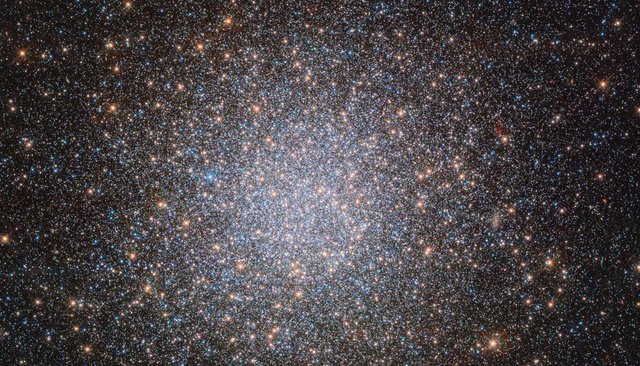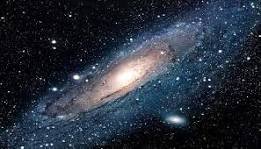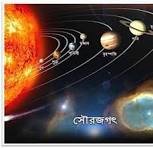
(https://www.protidinersangbad.com/science-technology/327580)
What is the universe? This question is one of the first questions of science lovers. Universe with every matter including time and space. Universe, which we call Universe in English. The universe is vast. No one has been able to give its exact definition even today.
Scientists have been studying the universe for many years. They look and observe the stars and planets. The study of these stars and planets is called astronomy. They want to find out the size of the universe. The answer is still beyond their grasp. But they know that it is still growing, no one knows when it will stop.
what is the universe:
According to NASA, the universe is a big-open place. You-I am in this universe. This includes the things you cannot see. It also includes the largest stars, such as the Sun. Even the smallest things on earth are part of the universe, eg: Amoeba, Entamoeba. We actually do not know how big the universe is!
The universe is everything. It includes all space, and all matter and energy that exists in space. Clockwork and even time are included in this universe, and of course, this includes your self.
Early discussion of the universe:
Earth and the Moon are part of the Universe, along with other planets and dozens of satellites like the Moon. As we know that the Earth revolves around the Sun, so do asteroids and comets. The Sun is one of hundreds of billions of stars in the Milky Way (special galaxy), and many of these stars have planets of their own, known as exoplanets.
The star nebula W51 is one of the largest "star factories" in the Milky Way Galaxy. Such "star factories" can operate for millions of years. Although the universe may seem like a strange place, it is not very far from us. Because we are living in it. May not believe. But let's think for a moment - wherever you are right now, outer space is only 62 miles (100 kilometers) away.
Day or night, whether you're indoors or outdoors, sleeping, eating lunch, or taking class, outer space is just dozens of miles above your head. It's right under you too. About 8,000 miles (12,800 kilometers) beneath your feet – on the opposite side of Earth – lurks the unrelenting vacuum and radiation of outer space.

(https://www.protidinersangbad.com/science-technology/327580)
What is the solar system?
When we talk about the universe, the first thing that comes to our mind is the solar system and its planets. There are 8 planets in the solar system. Again there is variation between the planets, such as the inner, rocky planets are Mercury, Venus, Earth and Mars. The outer planets are gas giants, including the giants Jupiter and Saturn, and the ice planets Uranus and Neptune.
In addition, there is a type of small planet called dwarf planet, which is called exoplanet in the language of scientists. Pluto is one such dwarf planet.
Mercury: The smallest planet in the Solar System and the closest planet to the Sun, Mercury is slightly larger than Earth's Moon. As seen from Earth, from the surface of Mercury, the Sun appears more than three times larger, and the sunlight is seven times brighter. Despite being so close to the Sun, Mercury is not the hottest planet in the Solar System.
It is slightly larger than the moon. It is the fastest planet, orbiting the Sun once in about 88 days.
Venus: Venus is the second planet from the Sun and Earth's closest planetary neighbor. Venus has a thick, toxic atmosphere filled with carbon dioxide, the planet is toxic and the hottest planet in the Solar System. The surface temperature of Venus is about 900 degrees Fahrenheit (475 degrees Celsius) which can melt lead instantly.
The air pressure on the surface of Venus is more than 90 times that on Earth which is normally felt under the ocean. On Venus, the sun rises in the west and sets in the east, which is the complete opposite of Earth.
Earth: Our home planet is the third planet farthest from the Sun, and the only planet where life exists. Although Earth is the fifth largest planet in the solar system, it is the only planet in our solar system that has water on its surface. Slightly larger than nearby Venus, Earth is the largest of the four nearest planets to the Sun, all of which are made of rock and metal.Earth is at least 4,543 billion years old. All planets except Earth were named after Greek and Roman gods and goddesses. However, the name Earth is a Germanic word meaning “soil”.
Mars: Mars is the fourth planet from the Sun and is a dusty, cold, desert area with a very thin atmosphere. Mars is a moving planet. This planet has been studied the most, where scientists say that there are aliens on this planet. Many dramas, movies have been made on this subject.
Jupiter: Jupiter, the fifth most distant planet from the Sun, is, by far, the largest planet in the Solar System. It was first discovered by Galileo. Jupiter's climate is actually surrounded by an atmosphere of ammonia and water, clouds, hydrogen and helium. The planet has a storm called the iconic Red Spot, which has been going on for hundreds of years.
Saturn: Saturn is the sixth distant planet from the Sun and the second largest planet in the Solar System. This planet has a ring around it that distinguishes it from other planets. Its main elements are hydrogen and helium.
Uranus: It is the seventh planet from the Sun, and the third largest planet in the Solar System. Uranus was discovered by astronomer William Herschel in 1781, although he originally thought it was a comet or a star
Neptune: Giant Neptune is the eighth and most distant planet in the solar system. It is also called cold and dark planet. At more than 30 times farther from the Sun than Earth, Neptune is the only planet in the Solar System that cannot be seen with the naked eye and was predicted before its discovery. In 2011, Neptune completed its first orbit in 165 years.

(https://m.facebook.com/ss01717044605/)
How old is the universe?
Many say that the universe appears to be about 13.8 billion years old. Scientists came up with this equation by measuring the age of the oldest stars and the expansion rate of the universe.
By observing the Doppler shift in the light from the galaxy, they found that the galaxies were moving away from Earth and from each other. In the near future, galaxies will be so far away that their light cannot be seen from Earth.In other words, matter, energy, and everything in the universe were tighter than they are now. They were close before, now moving away.
There is no need to think much about the birth of the universe. The universe did not exist. Space did not exist. Time is part of the universe and therefore had no existence. Time also began with the Big Bang. With time the concept of universe was formed and with it the concept of space was also formed.
What is the universe made of?
There are all kinds of energy and matter in the universe. Most of the matter in the universe is like a hydrogen atom, made up of only one proton and one electron. Many trillions of atoms combine together to form a dust particle, a basic component of the universe. Also tons of carbon, silica, oxygen, ice and some metals combine to form an asteroid. Or a star the size of a sun is formed from a mixture of 33 lakhs and 30 thousand hydrogens and helium.
Galaxies, star clusters, planets, dwarf planets, moons, rings, ringlets, comets, meteorites, underground water, rocks, serifs all make up the universe. The home galaxy, the Milky Way, also contains at least 100 billion stars and at least 100 billion galaxies. All these are part of the universe.
In short, the universe is made up of a lot of 'dark matter and dark energy', which until now has not been clearly understood. We cannot even imagine how many more mysteries are hidden in this universe.
Hi @nuha12, the Newcomers' Community is to help users through their Achievements and to help answer any questions that they might have about the platform.
I suggest searching for an appropriate community for any other content.
Downvoting a post can decrease pending rewards and make it less visible. Common reasons:
Submit
Newcomer's Community, WORLD OR XPILAR, আমার বাংলা ব্লগ, Korea • 한국 • KR • KO
Downvoting a post can decrease pending rewards and make it less visible. Common reasons:
Submit
আমার বাংলা ব্লগ
Korea • 한국 • KR • KO
STEEM CN/中文
Steem POD Team
WORLD OF XPILAR
STEEM FOR BETTERLIFE
Downvoting a post can decrease pending rewards and make it less visible. Common reasons:
Submit
The question of the origin and nature of the universe is a complex and profound one, and different perspectives exist based on scientific, religious, and philosophical viewpoints. I'll provide a brief overview of some prominent ideas:
Scientific Theories:
Big Bang Theory: The prevailing scientific model suggests that the universe originated from an extremely hot and dense state approximately 13.8 billion years ago in an event known as the Big Bang. This theory explains the expansion of the universe and the observed cosmic microwave background radiation.
Inflationary Theory: This idea proposes that there was a rapid expansion phase (inflation) during the early moments of the universe, smoothing out certain aspects and providing a solution to some cosmological puzzles.
Quantum Fluctuations: Quantum mechanics also plays a role in some theories, suggesting that random fluctuations in the quantum vacuum might have triggered the initial conditions for the universe.
Religious and Philosophical Perspectives:
Creation Myths: Different religious traditions have their own creation myths that explain the origin of the universe. These stories often involve the actions of a divine being or beings.
Cosmological Arguments: Some philosophical arguments propose the existence of a first cause or a necessary being that is responsible for the existence of the universe. These arguments are often linked to the concept of God in monotheistic religions.
Multiverse Hypothesis:
Some theories propose the existence of a multiverse, where our universe is just one of many universes. These multiverses could have different physical laws and constants.
It's important to note that scientific theories are continually refined and updated based on new evidence and observations. The origin of the universe remains a topic of ongoing exploration and investigation in various scientific fields, such as cosmology and theoretical physics. Different people may approach this question from different perspectives, and the answers can vary based on one's worldview and beliefs.
Downvoting a post can decrease pending rewards and make it less visible. Common reasons:
Submit
What’s this got to do with my comment?
Downvoting a post can decrease pending rewards and make it less visible. Common reasons:
Submit